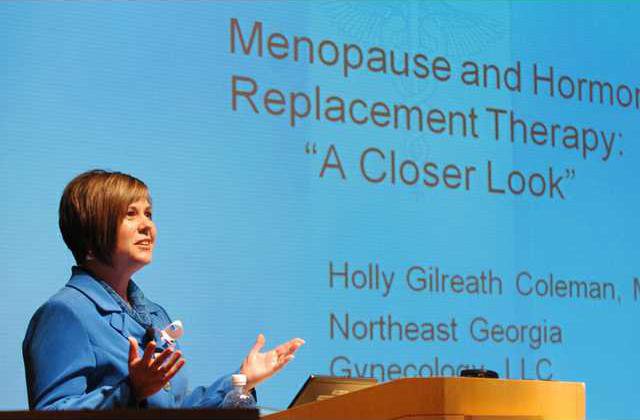There's at least one life cycle that many women would like to avoid - menopause.
The process, which all women experience, is signaled by a drop in the normal levels of the female hormones progesterone and estrogen.
On Thursday evening, Dr. Holly Coleman of Northeast Georgia Gynecology in Gainesville, sought to de-mystify the process for attendees of the WomenSource health seminar.
WomenSource is a nonprofit organization that connects women to professional resources in the community.
Thursday's event is an addition to the group's monthly lunch and learn sessions.
While many women may rush to seek out hormone replacement therapy treatments to deal with the main menopausal symptoms - such as hot flashes, osteoporosis and night sweats - Coleman urged the women to consider other options first.
"You should try alternative approaches to address your symptoms, before you begin hormone replacement therapy," Coleman said.
"Things like keeping the room temperature low, dressing in layers and using a neck cooling device can all help with hot flashes."
Even modifying one's diet to include things like natural soy products and avoiding caffeine can help.
Eating more grapes, plums, carrots and cucumbers can also help because they contain phyto-estrogen, or plant-based estrogen.
"If you haven't had any serious symptoms within the first several years of menopause starting, I wouldn't begin hormone replacement therapy," Coleman said.
Although menopause's duration can vary from woman to woman, it can last anywhere from a couple of years to around 10 or 15 for some.
"If you are on hormone replacement therapy, you should counsel with your doctor to determine to weigh your (personal) benefits against the risks," Coleman said.
Certain hormone treatments have been associated with increased risks of blood clotting, heart disease and cancer.
Just as the severity of menopause symptoms can vary, so do the risk levels of treatment complications, Coleman said.
"The duration of hormone replacement therapy shouldn't exceed five years," Coleman said.
"Maybe it's not so bad, you just need to weigh the risks."

